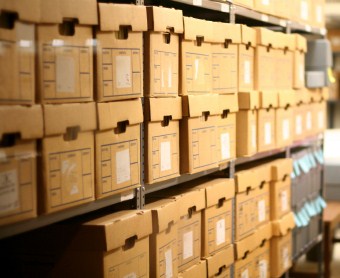Just for the record: Archive storage, and archive self storage


All businesses have to keep records. This is not just good practice: it’s the law ‒ mainly for the purpose of taxation. The regulations are a bit complex, depending on the size and nature of your business, but HM Revenue & Customs summarises it as follows: “As a general rule, you should keep your records for a minimum of six years.”
(For the finer details of record-keeping for the purposes of taxation etc, see the HM Revenue & Customs website: www.hmrc.gov.uk/record-keeping/index.htm)
Some businesses ‒ such as law firms ‒ may want to keep their records considerably longer than six years. Of course, a fair amount of these records will be stored electronically, but a lot will be on paper. A lot of paper. Boxes and boxes of the stuff, filling up the basement, spilling out of cupboards… blocking the fire-escapes. So much for the paperless office, pipe-dream of the 1970s.
Many companies and businesses simply do not have the capacity to store all their records and archives ‒ or cannot afford to devote valuable office space to huge quantities of material that they are unlikely ever to have to consult. They need help.
DIY archive storage
Small businesses, with a relatively low quantity of archives, can always rent self storage units. Make sure they are dry ‒ it is probably best to avoid container storage and garage lock-ups, and to go instead for purpose-built warehouse storage.
Self storage companies sell specially designed, cardboard “archive boxes”. They tend to come in three sizes: small, medium and large, with the large size measuring about 450mm by 380mm, and 290mm high. Archive boxes are built to take the weight of paper, are pierced at the sides with handles, and are fitted with lids for stacking and easy access to the contents. They cost between about £3 and £5 each, but are cheaper if bought in bulk packs of 20.
Archive boxes also have printed panels on the side in which you can list the contents, the date and so on. The details could also show a “destruction date” ‒ when the contents can be safely removed and destroyed (i.e. after six years for financial documents).
Good organisation and record-keeping are essential, so you can retrieve files and documents efficiently. Marking the side-panels on each box may not be sufficient: it may be better to number each box, and list the contents in detail on a computer file.
You may also like to consider dividing and storing your archives in two categories: “active archives”, which you may need to access quickly, or regularly; and “deep archives”, which are unlikely to be needed, but have to be preserved for legal, financial or record-keeping reasons.
If you want to keep your archives in a self storage facility, talk to the manager, who may be able to offer special business rates, and units that are specially put aside for the purpose.
Archive storage specialists
Self storage is not really an option for businesses and enterprises that have vast volumes of archives. It would involve too much to-ing and fro-ing, dedicated personnel to keep track of exactly what is where, and the detailed record-keeping that this implies.
Likewise, self storage is not suitable for businesses and enterprises with precious or highly sensitive archives that require a more secure form of storage.
This is where the archive storage specialists come in. There are a large number of companies which focus almost exclusively on archive storage. They offer facilities where records can be safely stored and efficiently managed (for example, through a barcode system), plus reliable delivery services between your offices and the facility, and secure document destruction.
Archive storage specialists can tailor their services according to your needs, for instance providing a regular schedule of pick-ups, a hierarchy of priced delivery services (including the immediate, emergency retrieval of stored documents; or pre-booked, time-sensitive delivery), and the scheduled collection of files and documents for secure destruction (using sealed security bags, and industrial-scale shredders, backed by certificates of destruction). Other services might include facilities designed to store architect tubes; storage of data tapes and electronic records; and the secure destruction of IT equipment and electronic records, in compliance with WEEE directives.
If security is paramount to your enterprise, you can choose an archive storage company that offers high-security facilities, and correspondingly secure staff-employment policies.
Given all these add-on services, using a specialist archive storage company can be remarkably good value, and costs may even be competitive with self storage.
Disaster recovery
Off-site archive storage (i.e. in a different location from your offices) is not simply about removing the dead-weight of old files and freeing up work space. It can also ensure that you have all the back-up you need to keep your business running, should your offices suffer a catastrophic disaster: flooding, fire, a terrorist attack, employee sabotage ‒ or whatever worst-case scenario you can imagine.
All businesses should have a disaster recovery plan. It may seem obvious to state this, but many don’t, and many go under within a few months of disaster striking. It is not difficult to envisage the precautions needed to avoid this, and archive/document storage is very likely to play a part. Specialist archive storage companies are able to advise on disaster recovery strategies, and can cater for the needs of larger enterprises. For smaller companies and businesses, self storage may well provide the answer.
Leave a Reply
Subscribe to This Blog
Get new blog posts sent to you by subscribing to RSS updates or to email updates.






